Everything You Required to Learn About Shipping Containers and Their Practical Applications
Shipping containers have actually progressed from simple devices for transport to flexible structures with many functional applications. Their durable style and typical sizing make them optimal for a variety of usages beyond shipping. From cutting-edge housing remedies to lasting farming, their adaptability is significant. Yet, the possibilities do not end there. Discovering their various functions exposes unusual insights right into modern-day challenges and creative remedies. What various other functions could these containers play in today's world?
The Style and Structure of Shipping Containers
Inside, containers are designed to make the most of area, commonly including wooden or steel flooring that can support considerable weight. Ventilation systems may be integrated to avoid dampness build-up, which is crucial for sensitive freight. In addition, reinforced corners permit very easy handling by cranes and forklifts, helping with seamless loading and unloading. This thoughtful layout and structure add to the containers' convenience across different shipping and storage applications.
Advantages of Using Shipping Containers
While lots of transport techniques have their advantages, making use of delivery containers stands out as a result of their unparalleled adaptability and effectiveness. Shipping containers supply a standardized size, making them easy to move and pile across various settings of transportation, including trains, ships, and vehicles. This standardization minimizes filling and dumping times, therefore enhancing total performance.
Shipping containers are created from resilient materials, providing durable defense for products during transportation. They are safe and weather-resistant, lessening the threat of damage from environmental variables or burglary. In addition, the modular design of shipping containers permits very easy customization, enabling services to adjust them for numerous functions, such as storage space or mobile offices.
Finally, their mobility and cost-effectiveness make delivery containers an eye-catching choice for businesses looking to improve logistics and supply chain procedures. These benefits add to the expanding appeal of delivery containers in different markets.
Imaginative Real Estate Solutions With Shipping Containers
Ingenious housing remedies have emerged as an amazing application of shipping containers, leveraging their integral staminas for household usage. These functional structures provide a lasting option to traditional structure materials, usually at a portion of the cost. Designers and engineers have actually changed containers right into fashionable, useful homes, accommodating diverse way of livings and preferences.

Additionally, shipping containers are environmentally pleasant, advertising recycling and minimizing waste. Several projects focus on energy performance, including solar panels and environment-friendly roofings. As urbanization increases, these innovative housing services provide a functional feedback to housing scarcities while cultivating a distinct architectural visual.
Shipping Containers in Retail and Pop-Up Shops
An expanding number of merchants are turning to delivering containers as a dynamic option for retail areas and pop-up shops. These flexible structures provide a cost-efficient option to traditional stores, enabling companies to develop distinct, appealing environments that draw in customers. Their modular design enables easy transportation and installation, making them ideal for seasonal or short-term retail locations.
Sellers can personalize shipping containers to mirror their brand identity, transforming them right into aesthetically appealing stores that stick out in congested markets. The small nature of containers likewise encourages efficient use of space, permitting for imaginative formats that enhance client flow and engagement. Shipping containers can be situated in non-traditional places, such as city parks or uninhabited lots, enhancing ease of access and foot traffic.

As the retail landscape develops, shipping containers provide a innovative and adaptable option that satisfies the demands of contemporary customers while enhancing the shopping experience.
Lasting Farming Practices Utilizing Shipping Containers
Sustainable farming methods significantly include shipping containers as cutting-edge remedies for farming - Shipping Containers. These container farms utilize hydroponics to take full advantage of space and resource efficiency, providing a cost-effective method to food production. By transforming delivery containers into farming hubs, farmers can attend to food safety and environmental concerns concurrently
Container Farming Benefits
While traditional agriculture deals with obstacles such as land deficiency and environment modification, container farming provides a sensible alternative that takes full advantage of room and resources. This innovative approach enables year-round crop production in controlled environments, decreasing dependence on weather. Container ranches utilize less water than traditional farming, advertising sustainability and conservation. They can be developed in city areas, bringing fresh produce closer to consumers and minimizing transport discharges. Additionally, the modular nature of delivery containers enables scalability, enabling farmers to adjust operations based on demand. Container farming additionally decreases pesticide use by developing a confined ecosystem, eventually boosting food security. As city populaces expand, container farming becomes a practical option to meet the enhancing need for regional, lasting food resources.
Hydroponics in Containers
Hydroponics, which allows plants to expand without dirt by using nutrient-rich water, thrives within the confines of shipping containers, making it an excellent technique for city agriculture. These containers produce a regulated atmosphere that maximizes light, moisture, and temperature, making it possible for year-round cultivation. With minimal area in metropolitan locations, delivering containers supply a scalable option for growing fresh produce. Hydroponic systems within containers can include numerous techniques, such as nutrient movie technique (NFT) and deep water culture (DWC), which optimize yield while reducing water use. This ingenious technique not just enhances Discover More food protection however additionally minimizes the carbon footprint linked with traditional farming methods. Consequently, hydroponics in containers represents a forward-thinking service for sustainable urban food production.
Cost-Effective Agriculture Solutions
As food manufacturing encounters increasing difficulties due to environment adjustment and urbanization, delivering containers become an economical service for farming. These functional structures can directory be repurposed for different lasting farming methods, such as hydroponics and vertical farming. By using controlled settings within containers, farmers can maximize growth cycles and lower source usage, consisting of water and fertilizers. In addition, delivering containers can be tactically put in city locations, decreasing transport expenses and improving accessibility to fresh fruit and vegetables. Their modular nature permits for scalability, enabling farmers to expand procedures as need expands. Repurposing containers adds to squander decrease, aligning with environment-friendly agricultural campaigns. Overall, shipping containers present innovative opportunities for efficient and sustainable food production.
Emergency Situation and Catastrophe Relief Applications of Shipping Containers

Organizations frequently utilize shipping containers to create mobile facilities or field healthcare facilities, ensuring that medical treatment reaches those in requirement. In addition, they can be changed right into command centers for working with rescue operations, therefore improving organizational efficiency during dilemmas.
Furthermore, containers can be customized to store necessary products such as food, water, and garments, protecting products up until they are distributed. Their flexibility enables them to be easily transferred to various places, making certain that aid gets here where it is most quickly needed. In general, delivery containers play a crucial function in enhancing the efficiency of disaster alleviation efforts worldwide.
Regularly Asked Inquiries
Just How Are Shipping Containers Transported From One Area to One More?
Shipping containers are carried via vehicles, ships, and trains, using cranes for discharging and filling. This multi-modal transport system makes sure effective activity throughout land and sea, attaching worldwide supply chains and assisting in international profession.
What Is the Typical Life Expectancy of a Shipping Container?
The typical lifespan of a delivery container generally varies from 10 to 25 years, depending on maintenance, usage, and ecological elements. Appropriate treatment can expand their usability, while overlook may result in deterioration and damage.
Can Shipping Containers Be Modified for Various Usages?
Yes, shipping containers can be modified for various usages. They offer as homes, offices, pop-up stores, and storage devices. Their convenience enables for imaginative adaptations, making them appropriate for a vast array of applications.
Are Shipping Containers Ecologically Friendly?
Shipping containers can be eco-friendly, as they advertise reusing and repurposing. Their longevity decreases waste, while their use in alternate housing and services lessens the demand for brand-new materials, adding to sustainable techniques.
Exactly how Do I Select the Right Dimension Shipping Container?
To choose the best dimension delivery container, one must evaluate storage needs, consider the intended usage, and assess space availability - shipping containers additional info for sale near me. Common sizes include 20-foot and 40-foot containers, each offering numerous storage space and transportation requirements efficiently
Ingenious real estate solutions have actually arised as an amazing application of shipping containers, leveraging their intrinsic toughness for residential use. The flexibility of shipping containers allows for imaginative designs, from single-unit homes to complicated multi-container arrangements. Lasting farming techniques increasingly include delivery containers as ingenious solutions for farming. In addition, the modular nature of shipping containers allows scalability, permitting farmers to adjust procedures based on need. Hydroponics, which allows plants to expand without soil by utilizing nutrient-rich water, prospers within the boundaries of shipping containers, making it an ideal method for urban agriculture.